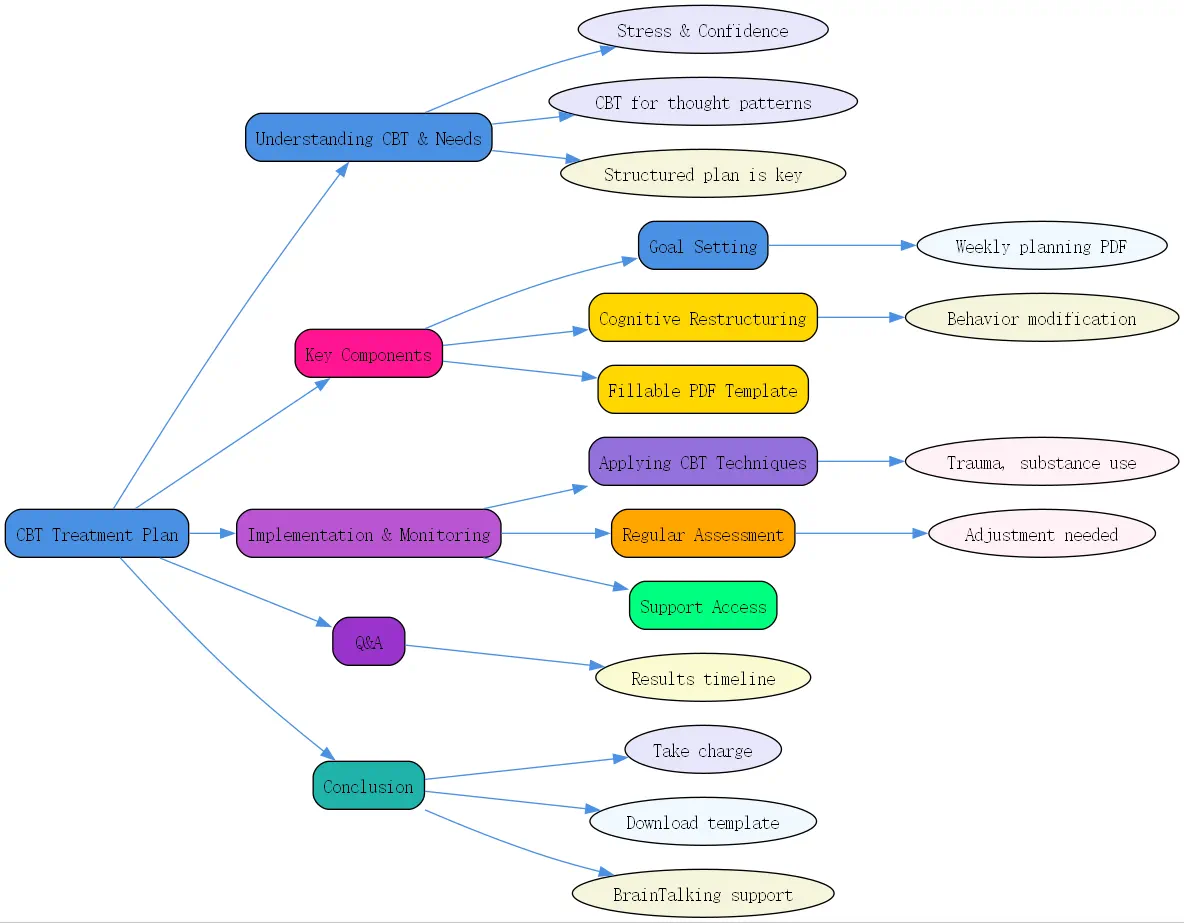Understanding Stress, Confidence, and the Need for a CBT Treatment Plan (Template Focus)

Welcome to BrainTalking’s guide on using Cognitive Behavioral Therapy (CBT) to tackle stress and boost confidence in adults. CBT is a proven, evidence-based approach that helps people identify and shift negative thought patterns and behaviors. It’s especially effective for stress management because it equips you with practical tools to cope better and feel more in control.
Stress is something we all face—whether it’s from work deadlines, financial pressures, or relationship challenges. While a little stress can push us forward, too much can wear us down, both mentally and physically. Confidence, on the other hand, is that inner belief in ourselves. When stress piles up, it often chips away at our confidence, trapping us in a cycle of self-doubt and worry.
That’s where a CBT treatment plan comes in clutch. It’s like a roadmap, guiding you through the chaos with clear steps and goals. By focusing on how your thoughts, feelings, and actions connect, CBT helps you break free from stress and rebuild your confidence. Our free CBT treatment plan template PDF (with fillable fields!) makes it easy to get started, whether you’re a newbie or already familiar with the process.
Why use a structured plan? Because it keeps you on track. Research, like studies from the Matilda Centre, shows how mental health struggles—like stress or trauma—can spiral if left unchecked. A fillable template gives you a hands-on way to set goals, track progress, and stay motivated, all tailored to adult stress management and confidence building.
Key Components of a CBT Treatment Plan for Stress & Confidence (Fillable Template)
Goal Setting and Weekly Plan (PDF, Fillable)
Kicking off a CBT treatment plan starts with setting goals. We use the SMART method here—Specific, Measurable, Achievable, Relevant, and Time-bound. For example, instead of saying, “I want less stress,” try, “I’ll do 10 minutes of deep breathing daily for a month to lower my stress.” It’s clear, doable, and has a timeline.
Once your goals are set, it’s time to map out a weekly plan. This could mean scheduling CBT exercises like journaling negative thoughts or practicing relaxation techniques. Our treatment plan goals for self-confidence, stress management, and weekly plan PDF make this a breeze. With fillable sections, you can tweak your schedule as life happens, keeping it flexible yet structured.
Why does this matter? A plan turns vague intentions into action. Studies, including those from the University of Sydney, highlight how structured interventions reduce mental health burdens. For adults juggling busy lives, a weekly plan ensures you carve out time for yourself, boosting both stress relief and confidence over time.
Cognitive Restructuring and Behavior Modification Techniques
Next up is cognitive restructuring—fancy words for spotting and challenging those pesky negative thoughts. Say you catch yourself thinking, “I’m a failure.” CBT teaches you to question it: “Where’s the proof? What have I done well lately?” This shift can lighten stress and lift your confidence fast.
Behavior modification is the other half of the equation. It’s about swapping out habits that fuel stress—like procrastination—for ones that help you thrive. Maybe you break big tasks into bite-sized steps to feel less overwhelmed. These techniques are core to our confidence stress management workshop at BrainTalking, where we dive deep into practical ways to rewire your habits.
Together, these methods tackle the root of stress and self-doubt. Trauma research, like that from the Matilda Centre, shows how negative beliefs (e.g., “I’m not good enough”) often stem from past experiences. By addressing them head-on, you’re not just managing symptoms—you’re building a stronger, more confident you.
Template PDF and Fillable Fields
Our CBT treatment plan template PDF is your secret weapon. It’s got fillable fields for everything—goals, weekly plans, exercise logs, you name it. Start by popping in your SMART goals. Then, fill out your weekly schedule. As you go, track how your mood or stress levels shift. It’s all right there, easy to update on your phone or laptop.
Using it is simple. Step one: define your stress management goals. Step two: plan your week with specific CBT tasks. Step three: check in regularly to see what’s working. This hands-on approach keeps you engaged and accountable, making the CBT treatment plan for adult stress management and confidence a total game-changer.
Implementing and Monitoring the CBT Treatment Plan for Adults
Applying CBT Techniques to Address Trauma and Substance Use
Putting your plan into action means weaving CBT into your daily grind. When a stressful thought pops up, hit it with cognitive restructuring. If a bad habit creeps in, counter it with behavior tweaks. But here’s the kicker: if trauma or substance use is part of your story, a trauma-informed approach is key.

Trauma can amplify stress and shred confidence—think of the stats from the Matilda Centre showing nearly half of young people in custody have faced it. For adults, those echoes of past pain can linger too. CBT, paired with trauma-informed care, helps you process those experiences safely. If substances are in the mix, professional support can pair with your plan for better results.
At BrainTalking, we get it. Our resources, like the Asperger syndrome and anxiety: a guide to successful stress management, offer tailored tips. Whether it’s trauma or everyday stress, applying these evidence-based techniques can transform how you feel and function.
Regular Assessment and Adjustment
Checking in on your progress isn’t just a nice-to-have—it’s a must. Our template has a section to log how you’re doing. Feeling less stressed? More confident? Write it down. If something’s off, tweak your goals or techniques. Maybe swap journaling for meditation if it suits you better.

This step keeps your plan alive and kicking. Research backs this up—consistent monitoring, like what’s recommended in youth justice settings, catches issues early and boosts outcomes. For adults, it’s about staying flexible. Life changes, and so should your stress management treatment plan. Regular reviews keep it personal and effective.
Accessing Support and Resources
You don’t have to go it alone. Professional guidance can supercharge your CBT journey, especially if stress or trauma feels overwhelming. BrainTalking’s got your back with tools like our confidence stress management workshop and that handy template PDF. Need more? Reach out to us—we’re here to help.
Beyond that, dive into trusted resources. The American Psychological Association and National Institute of Mental Health offer gold-standard info on CBT and mental health. Internal links to our site—like articles on relaxation techniques—can deepen your toolkit too. Support is out there; grab it and thrive.
Q&A Section
Q: How long does it take to see results from a CBT treatment plan for stress management? A: Great question! It varies person to person, depending on stress levels and commitment. Most folks notice a difference within a few weeks—say, 4 to 6—of steady practice. Big changes, like rock-solid confidence, might take a few months. The key? Stick with it. Regular use of your CBT treatment plan for adult stress management and confidence (template PDF fillable!) drives results. Patience and consistency pay off.
Conclusion
Stress and confidence don’t have to be a tug-of-war. With a solid CBT treatment plan, you can take charge of both. Our fillable PDF template is your starting line—download it, set your goals, and watch the magic happen. Backed by science and tailored for adults, it’s a practical way to ease stress and grow confidence in 2025 and beyond. Need a hand? Contact BrainTalking. Your better mental health is just a step away.

- CBT rewires negative thoughts for less stress and more confidence.
- SMART goals and weekly plans keep you focused and moving forward.
- Download our free, fillable PDF template to kickstart your journey.
- Regular check-ins and support amplify your success.




